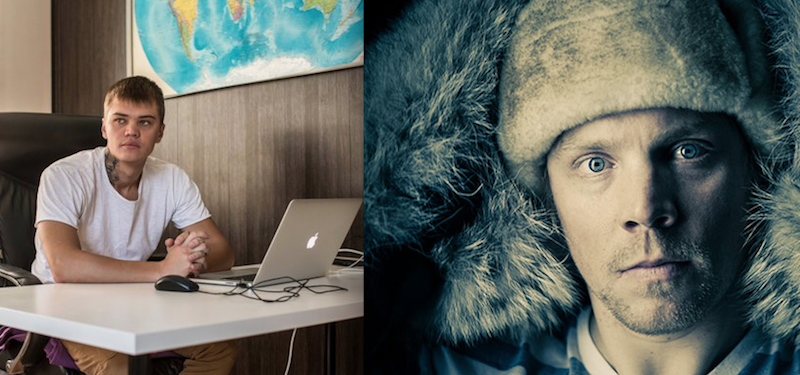Can you guess who it is? Wrong!
When you think of the most fabulously interesting snowboarders who flits across your mind? Is it Travis Rice? Jeremy Jones? Maybe, if red is your kink, even Shaun White? What about Vladimir M. Fomenko?
“Who?” You ask. “Did you mean Iouri Podladtchikov?”
“No!” I respond, visibly annoyed. “Vladimir M. Fomenko.”
Should we learn about him through the pages of the New York Times? Well of course we should!
Over the summer, a long slog of digital sleuthing into the cyber attacks on the Democratic National Committee and others improbably led to this isolated spot. In mid-September, I followed the trail here to meet Vladimir M. Fomenko, a 26-year-old snowboarder who is the only individual so far identified in the online intrusions, which cybersecurity experts have attributed to the Russian state security agencies.
One security company had, on Sept. 2, identified what it called an “infrastructure nexus” linked to two intrusions on state election board computers in Illinois and Arizona. Mr. Fomenko managed that “nexus,” as the owner of a server company.
But the revelation didn’t draw much attention, and Mr. Fomenko said nothing for two weeks.
Padding about my apartment in Moscow one morning with a cup of coffee, I got a phone call. An acquaintance in the computer business had a tip: Mr. Fomenko had been looking for a publicity agent, as he was planning to issue a statement later in the day. He wanted to talk.
It seemed an important development in the story of the hacks on the national committee and other election targets in the United States, a tale until then characterized by digital forensics but no people.
Mr. Fomenko and I talked on the phone. He denied any knowledge of the hacks as they were happening but conceded these intrusions could have been staged from his server computers. He operates his business from a rented apartment and spends his free time snowboarding in the Altai Mountains. He was open to a visit.
Soon enough, I was on an Aeroflot red-eye heading east. In the internet age, it turns out, you can live near Mongolia and still be at the center of the highest-profile computer-hacking story in America in years.
The unlikely remoteness of his residence seemed relevant, given the high-profile nature of the hacks in the United States — a sort of illustration of the dark side of globalization.
The city is a two-hour drive from the nearest commercial airport. To be fair, a good number of outdoors lovers and other tourists pass through on their way to the Altai Mountains, a picturesque highland in the south of Siberia also known for good skiing. From time to time, Harley Davidsons rumble through town, as bikers from Europe and elsewhere have taken a shine to the ride to Mongolia. Still, it felt far removed.
Mr. Fomenko and I met in a rooftop bar called Rocks in the late afternoon and watched the sun set over the southern Siberian steppe.
His denials were vague, and the interview illustrated the equivocation and ambiguity in both official and unofficial Russian responses to the allegations that the security services are hacking America’s election computers.
For the night, I booked a room at Art-Eco hotel, a Siberian-themed establishment constructed entirely of logs that gave off such a piney smell that the sensation was of sleeping inside a lumber mill.
With the bread-and-butter of the story in my notebook, the next day I looked around the city for some ancillary material to further illustrate the remoteness of this place and the improbability of a resident here playing any role in an American presidential election. The location deep in Siberia was also relevant for highlighting his inaccessibility to the Federal Bureau of Investigation, which is probing the electoral hacks as possibly an effort to undermine Americans’ faith in our election process. Why was this mysterious computer expert living out here? I spoke to locals, including the curator of the city history museum, a warm and knowledgeable man named Dmitry V. Yeroshkin.
The city’s slogan is “Gateway to the Chuysky Highway.” Biysk had been a border fort along the Tsarist Empire’s frontier with China. The nature all around is lovely. Why wouldn’t somebody want to live here?
“Yes, we are in the middle of nowhere, “ Mr. Yeroshkin said. “But we have two museums and a drama theater.”
Siberian-themed art-eco resorts? High-level hacks of foreign governments? Neck tattoos and smokey blue eyes?
Eat your heart out Travis Rice!
